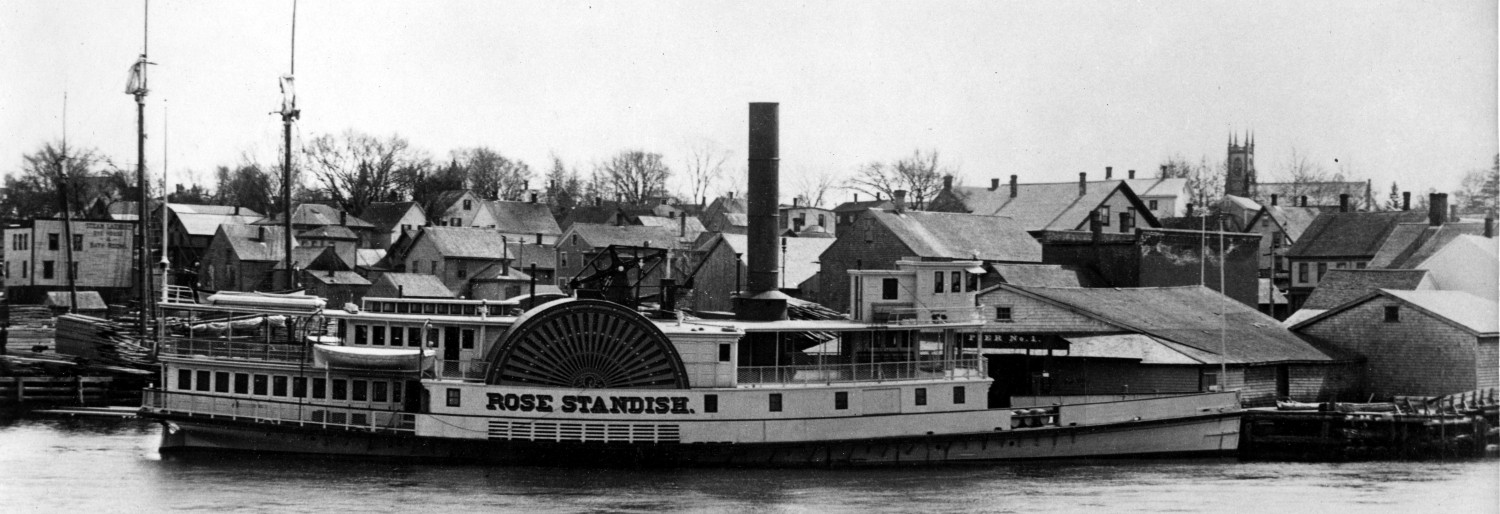Ancestry.Com has recently added hundreds of national newspapers, some as early as 1820, to its site. This allows us to research the Bangor Daily News, the Bangor Whig and Courier and national newspapers for articles and other items of interest related to the St. Croix Valley. It is surprising how often items local to the St Croix Valley appeared in these papers. This week we have selected some items from the newspapers of 1905 which provide a snapshot of life in the valley in the early 1900s.
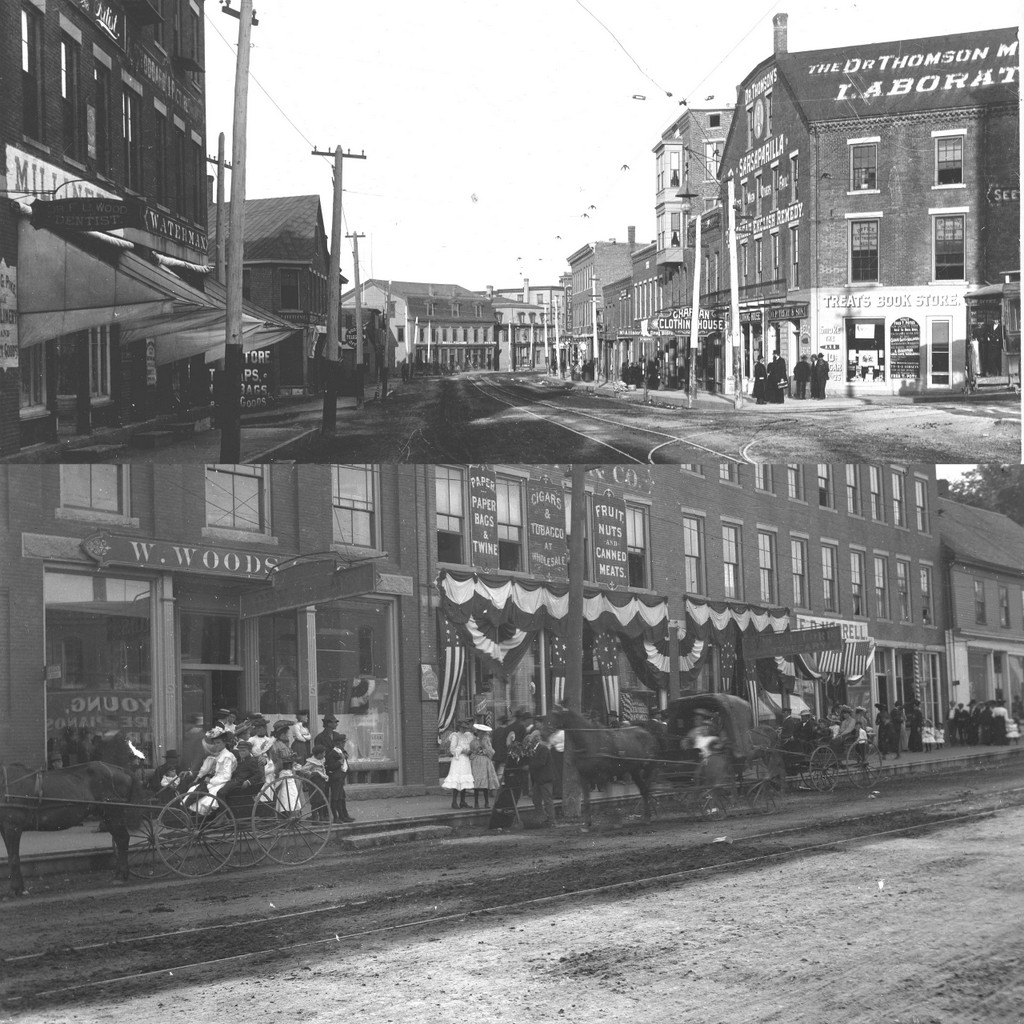
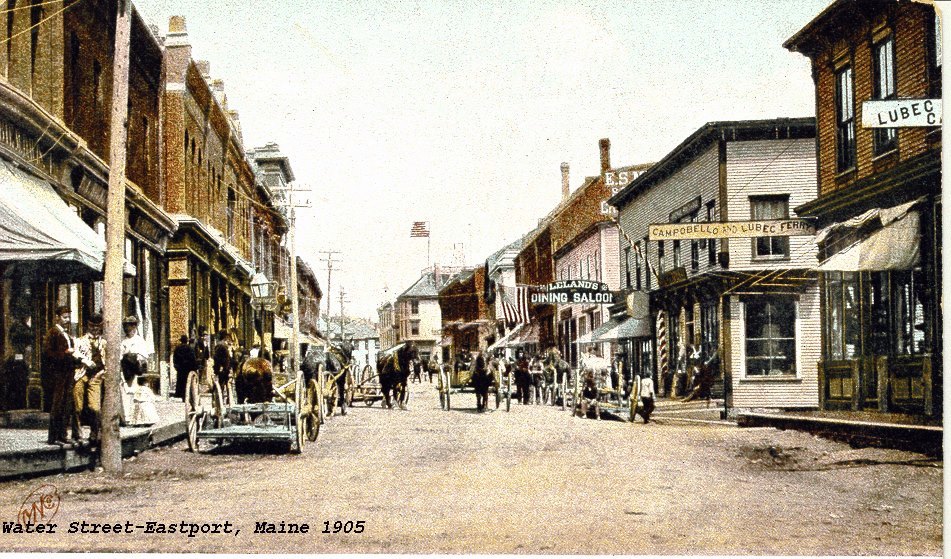
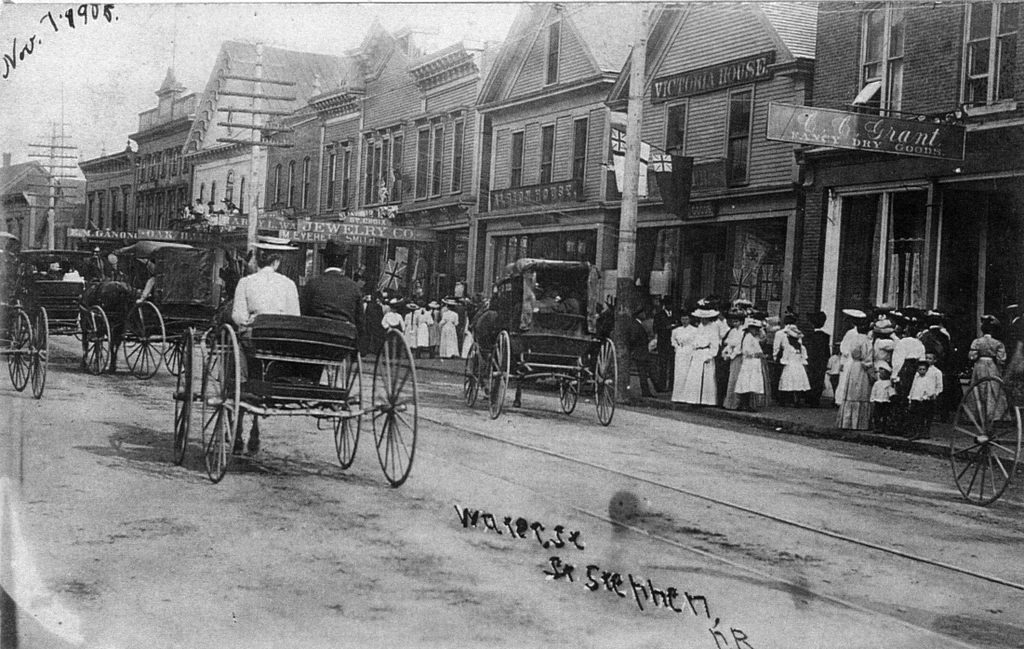
In 1905 the three principal towns in the St Croix Valley were Eastport, Calais and St. Stephen. The population of Calais/Milltown was 7500, Eastport 5300 and St. Stephen/Milltown 5700. Princeton had about 1100 residents, Robbinston 890 and Indian Township but 87. The Main Streets of all three towns were busy and vibrant although the economy of the valley was somewhat in decline- the population of nearly every town in the area was to decline over the next decade. However one economic engine remained strong even as lumbering and shipbuilding declined- smuggling. A vast quantity of goods, legal and otherwise, flowed duty free across the border, kerosene, liquor, sugar, venison, wool and the national papers were endlessly fascinated by the crooked goings on Downeast. The tax authorities were also fascinated but seemed powerless to enforce customs laws in the St. Croix Valley.
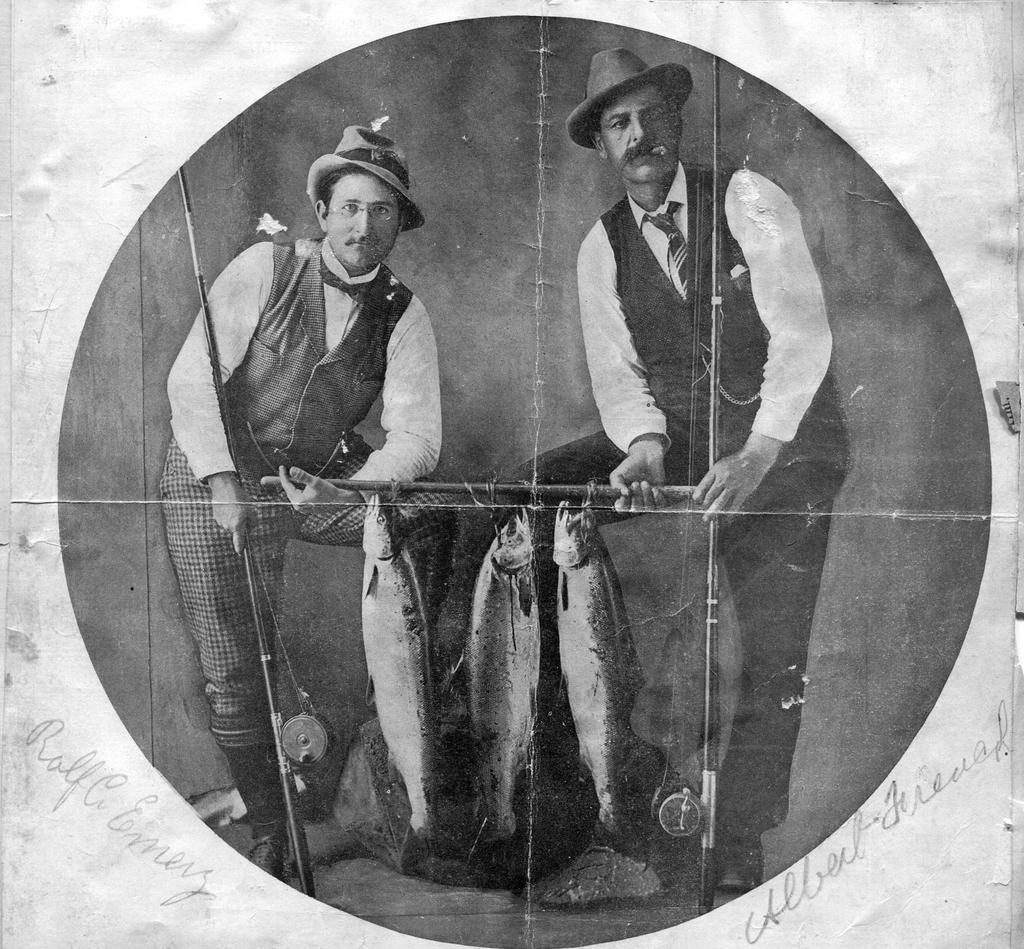
Consider the case of Albert French, famous and/or infamous Calais Game warden who a few years earlier in 1903, after his retirement as a warden, had been charged by the wardens who replaced him with illegal possession of nine freshly killed deer which French was transporting to Boston when he and the deer were arrested on a ship in Eastport bound for Boston. Boston and New York restaurants paid a hefty price for venison which was considered a delicacy at high end restaurants and many local poachers did quite well for themselves supplying the trade. A blood feud developed between French and new wardens which only worsened after French sued the warden who had confiscated his deer and won. Soon after the salmon began to run in 1905 and after French was reported to have caught the first salmon of the year, the Bangor Daily reported:
“The people around the Union were startled on Monday by hearing the report of an explosion in the vicinity of Union Mills where the great salmon fishing is and on investigation, they found a few dead fish on the top of the water about 75 yards from the falls. It looked very suspicious and also like an attempt to blow up Mr. Albert French who was out in his boat fishing at the time. A thorough investigation will be made and if the perpetrators of this dastardly act are found they will be punished as they deserve.”
In the end the perpetrators were not found, and the wardens charged French with illegally taking salmon from the pool. On August 7, 1905 the Bangor Daily gleefully announced that “Albert French had been vindicated of the charge of illegally taking salmon from the pool at the Union” and “This was no surprise to the accused man as he knew all along he had been charged without grounds.” The Bangor Daily never made any secret of where its sympathies laid in the French-Game Wardens feud of the early 1900’s.
The smuggling of deer meat to Boston was ongoing in 1905. The Boston Globe reported on February 21st, 1905:
Cargo shipped from Calais, Me will be Sold or Destroyed:
Judge Fessenden of the Superior Court declared forfeited today a cargo of game shipped from Calais Maine as household furniture to Mrs. Clara Wilson of this city, in a bill brought by Game Warden T.L. Burney who alleged the game was in the state illegally. No one put in a claim for it. It was seized in the freight house of the Bangor and Maine Railroad on December 2 and consisted of the carcasses of 12 deer, four saddles of venison and 167 partridges.
Wool was another dutiable item which was smuggled in large quantities. On July 31, 1905, the Montreal Star reported a large shipment of wool smuggled from St. Stephen to Calais was seized in Boston when the steamship St. Croix out of Eastport docked in Boston. Wool merchants in Montreal were somehow involved in this transaction. In 1906 John Johnson, who had a woolen mill at the bottom of Steamboat Street, was charged with smuggling wool across the river in a case which attracted national interest. He was acquitted and returned to Calais on the train after his Bangor Federal Court trial to a hero’s welcome at the Calais train station.
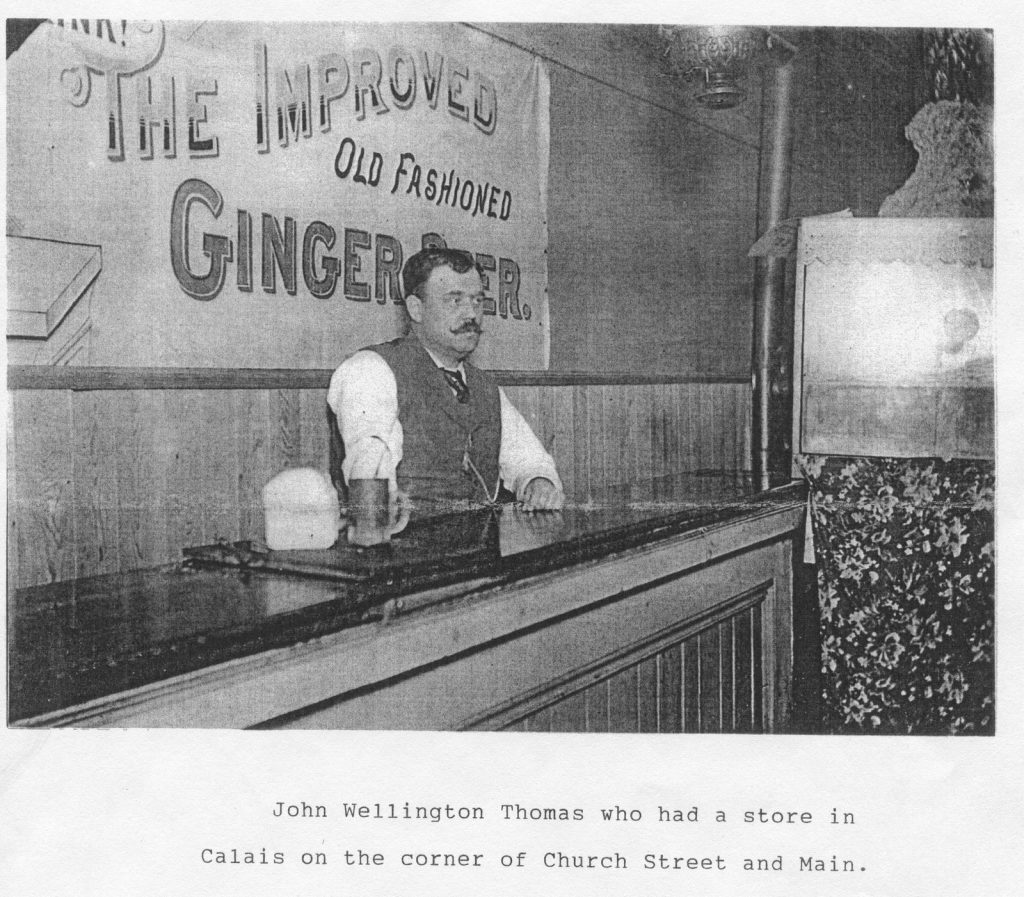
The first prohibition law in the country was enacted in Maine in 1846, nearly 80 years before national prohibition. Of course New Brunswick was wet and folks in other parts of the country loved stories about the ingenious ways Downeasters managed to evade the law. In June 1905 the Galveston Texas Daily News and other national newspapers carried an article which begins as follows:
MAINE THIRST STIR INGENUITY
CLEVER SCHEMES ARE DEVISED TO SELL LIQUOR
Calais, Maine
Happy above all others in this sun-kissed, throat-parched, water-cursed State, are the citizens of Washington county who live along the Sunrise Line across which lies the English land flowing rich with the tender juices of the rye and whose air is fragrant with the uncensured drafts of the distillery. The lid is down in Washington county. But not too hard. In fact, the lid is closed here with a very gentle and susceptible spring permitting it to rise at the touch of a child.
The writer goes on to describe trips across the border to St. Stephen and for those who prefer to drink at home, the ease with which is brought back from St. Stephen:
Bicycles with tires inflated with Kentucky mountain dew instead of air, suitcases with false bottoms, non-leakable dolls, nice for the baby after papa has unscrewed the leg and numerous other ingenious designs for the first aid to the thirsty, still make life a little worth living way down here in the “Prohibition State”.
For those who craved a drink but didn’t want to break the law the local druggist, Percy Lord, whose drug store later became the Rexall on Main Street, offered a cure “to people who are desirous of being freed from this horrible disease caused by the excessive use of whiskey, beer or other alcoholic stimulants.” It came in the form of Orrine’s Powder which was “guaranteed to cure the craving or your money back.” For those who wanted to cure a drinker who didn’t necessarily want to be cured “Orrine’s Number 1 powder can be given secretly in tea, coffee and food without the patient’s knowledge.”
In 1905 Lord’s Drug Store sold lots of other potions and medicines which were probably more dangerous than alcohol such as patent medicines laced with opium and other narcotics. Many were arguing “There should be a law…” and finally in 1905 the Maine Legislature enacted a law which required druggists to disclose on the label the alcohol and other drug content of patent medicines. How much good this did is debatable. The effectiveness of such quack medicine as Dodd’s Kidney Pills was sworn to by Mrs. A.L. Smith of West Pembroke in thousands of ads in hundreds of national papers in 1905. Her 13 year old daughter had “Crazy Spells which would last a week” but “After taking one box of Dodd’s Kidney Pills she has not had one bad spell”.
In truth patent medicines caused an epidemic of addiction to cocaine and opium in both men and women, even those who considered themselves “respectable”, which was only curtailed after Teddy Roosevelt convinced Congress to pass the first federal food and drug legislation.
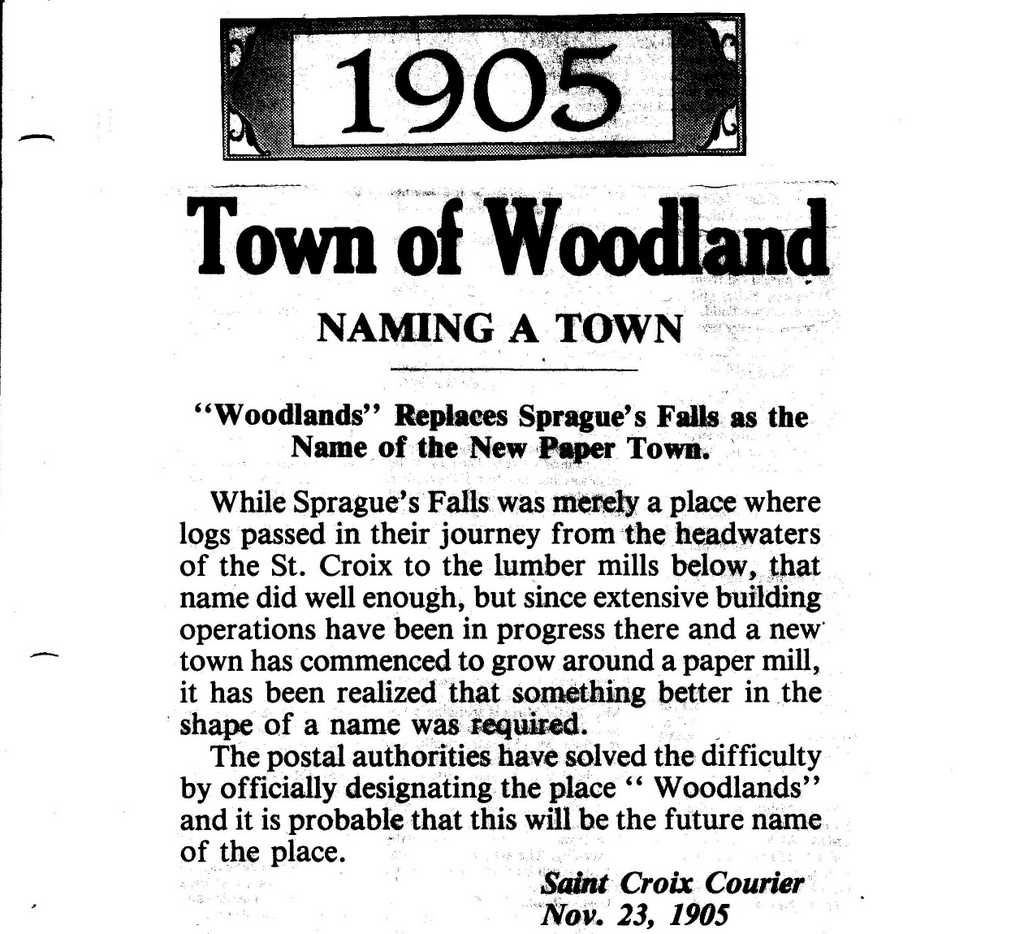
In other news of 1905:
The paper mill in Woodland was being built and the town probably had a population of over a thousand, nearly all of them Italian laborers.
The Guymon Herald of Guymon Oklahoma and many other papers reported that a rich load of Molybdenite had been discovered in Cooper Maine.
The Miner’s Journal of Pottsville Pennsylvania reported a blurb in the Calais Advertiser:
On opening a barrel of beef the other day the cook of the an up-river lumber camp found a shingle on which was inscribed:
“Although I’m dead and salted here, I was a truck horse all last year.”
The Courtland Kansas Register reported:
Report of Death “Exaggerated”
It is related in the correspondence from Calais Maine., that Harris Hill, one of the city’s aged and respected citizens, was sick. Later on it got around that the worthy old gentleman was dead, so one day while he was out in his yard his friends from miles around drone up to attend his funeral, which much surprised the old gentleman.
Newspapers around the country loved the story of the trial in Calais of one Harold E Kelley for bigamy. He had married at least two women in Massachusetts, one in 1899 and another in 1903 before coming to Washington County and marrying wife number three in 1904 always without divorcing his prior wives. His defense was insanity which the Calais court found unconvincing and sentenced Harold to a long term in State Prison.
According to Bureau County Tribune of Princeton Illinois:
Wedding Not Worth Paying For
During the early years of his ministry at Calais Maine Rev. George Durrell was one day called upon to perform the marriage ceremony for a couple who came into town from some outlying section, and after the ceremony the woman said:
“Say, parson, Jim ain’t got no money, but I’ll be around tomorrow and pay for this job.”
Some two weeks afterwards she met Mr. Durrell on the street, and recalling herself to his memory, saying:
“You know parson, I was going to pay you for that job you done for Jim and me, but I didn’t, for Jim run away the next day, and I didn’t think it was worth while.”
A fellow from Red Beach who apparently went tramping had an interesting adventure in 1905:
From the San Bernardino Daily Times February 16, 1905
LOCKED IN A FRUIT CAR FOR A WEEK
William Smith an Orange Picker of Pomona Makes the Journey to Kansas City and is More Dead Than Alive
REDLANDS Feb 16 —
Locked In the dark confines of a fruit car with nothing to eat but oranges and nothing to drink but orange juice William Smith an orange picker who resided In Pomona during most of the season was found this week in a half dead almost blind and nearly starved condition at Kansas City.
The story as told by Smith is a remarkable one. Week before last he got out of work and decided to economize by sleeping in a fruit car. A search was made, and a car already loaded was found. It had not been sealed and Smith crawled in upon boxes, spread his blanket and was soon lost in slumber. Following their usual custom, the trainmen sealed the car preparatory to going east that evening and before Smith was aware of what was happening, he was locked in the car and journeying eastward. The unwilling passenger was unable to attract the attention of the train crew. When the train arrived at Kansas City the car was opened and Smith was found. It was just seven days from the time he had started but day and night had been alike to him. He was taken to a hospital in an exhausted condition but was soon able to make known his Identity. He said that his relatives resided in Red Beach Maine.
We’ll end 1905 on a heartwarming note.
From the Calais Advertiser:
March 15, 1905: Mr. Lynch, who recently made several trips to Calais with children from a Boston orphanage, was here on Sunday last with eleven more orphans. Mr. Lynch addressed the congregation of St. Stephen’s church immediately following the high mass at 10 o’clock. He had the little unfortunates present with him, and his earnest address on behalf of the children was eloquent and pathetic. We are pleased to state that no difficulty was experienced in securing good homes for every child.
